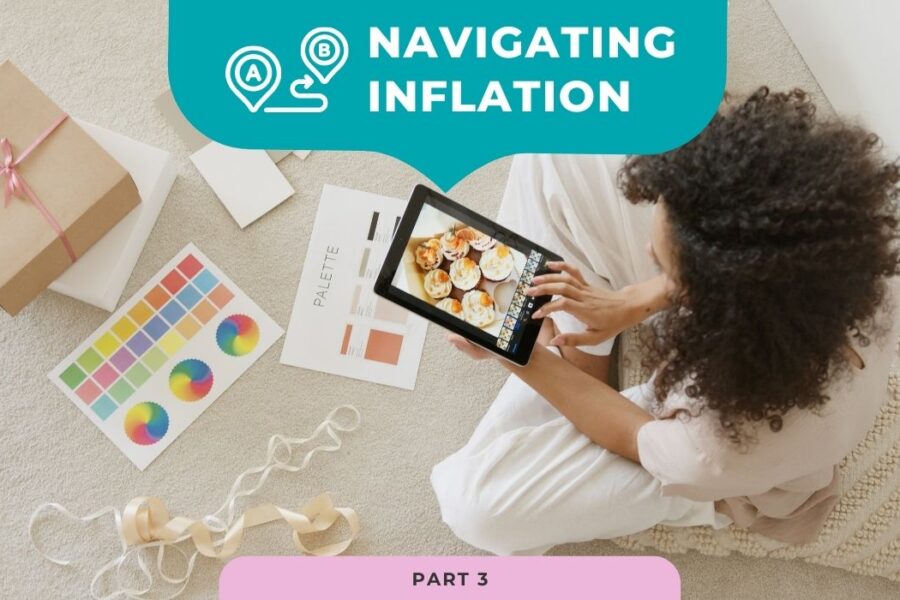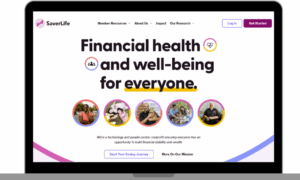
It’s no secret that inflation is high. But did you know these conditions might make it more difficult for you and your business to borrow money, produce your goods or services, and maintain inventory?
Inflation is hard on small business owners, but there are steps you can take to protect yourself and your business.
One of the best things you can do for your business during this time of inflation and high interest rates is to know your true cost of doing business. Know what your business’s essential spending is, pay attention to the terms of borrowing money, and look critically at your costs and cut back if you have to.
Inflation Background
Inflation was reported at 8.3% in August 2022. As a response to the higher inflation rates, the Federal Reserve has raised interest rates to try to slow inflation.
It’s important to remember that when the Fed increases interest rates, they are increasing the short-term interest rates at which banks lend money to other banks. This, in turn, raises interest rates for consumers because it is more expensive to lend money. Interest rates on mortgages and car loans will often also increase. Consumers typically see interest rates on savings vehicles such as savings accounts or Certificates of Deposit (CDs) increase as well.
Along with rising interest rates, consumers will see their budgets tighten as their dollars won’t stretch as far. But higher inflation and interest rates don’t just affect consumers. They also have an impact on small business owners.
Here are 4 ways inflation and higher interest rates affect small business owners and what you could do as a small business owner to help protect yourself:
Impact #1: Higher Inflation Means You’ll Face Higher Costs for Supplies
Inflation has made it more expensive to do business. As inflation rises, so does the cost of inputs to business. In fact, in 2022, 71% of small business owners reported the cost of supplies for their business has increased. If you are a small business owner, this rise in the costs of inputs likely means it is more expensive for you to create or produce your products and get them to your customers, which can ultimately cause your profit margins to shrink.
What Can You Do About It?
As a small business owner, you can’t control the prices you face for your inputs, but there are a few things you can do to help your business continue to thrive. First, be sure you are being compensated fairly. It may not be time to raise prices, but now is a good time to be sure you’re priced competitively and fairly. Be sure to consider the cost of your inputs, your time, shipping costs, and any other fees you might incur when you conduct your review.
Another area to consider is your operating costs. Make a list of all of the services or subscriptions you’re paying for. Be sure each subscription or service is one you actually need to run your business. It may also be a good time to shop around for your inputs if you create or manufacture your products. Don’t sacrifice quality for a lesser price. But shop around to see what’s out there. You may be able to find a good alternative at a better price.
Impact #2: Higher inflation and higher interest rates can result in decreased consumer spending
As prices rise across the economy, consumer spending can fall. The reason for this is twofold. First, consumers are facing higher prices for necessities, so there isn’t as much wiggle room in their budget. Second, as interest rates rise, it is harder and more expensive to borrow money. This can leave consumers with less cash to spend. In turn, this decrease in spending can cause business to slow for small and big businesses alike.
What Can You Do About It?
While you can’t control how much money your customers spend, there are a few things you can do to lessen the blow of decreased consumer spending. First, be sure you’re open and honest with your customers. Listen to their concerns. Let them know you understand money is tight, and you appreciate any and all support they can give. Honesty and a personal touch can help you earn goodwill with your customers and will keep you top of mind.
Another thing you can control a little more is how you run your business. If you are a goods-based business, you can do this by monitoring the amount of inventory you hold in stock. If business is slowing down, you can save yourself money by ordering less inventory. Similarly, if you are a service provider and business has slowed, you may want to look into alternative ways to earn money in your industry.
Impact #3: Rising Interest Rates Will Make it Harder for Small Businesses to Borrow Money
Remember, as the Federal Reserve shifts monetary policy to curb inflation, they do so by raising the short-term interest rates at which banks can borrow and lend money to one another. This then raises interest rates for consumers.
As a small business owner, when this happens, it will become more expensive for you to borrow money and finance things for the business. You may also see interest rates increase for current debts with variable rates. If this happens, a larger portion of your budget might have to go toward debt repayments. It may also mean that as it gets expensive to borrow money, you may need to delay larger purchases or expansions you were planning to finance.
What Can You Do About It?
It is important whenever you borrow money, but especially during times when interest rates may change, to be sure you understand the terms of your loan. If you get a loan with a variable interest rate, factor in how changes in interest might affect your budget and be mindful of how you will pay back your loans.
If you need to borrow money at a time when interest rates are rising, take time to shop around for the best loan terms. And as always, only borrow money when you have to, and be sure you’ll be able to keep up with the payments.
Impact # 4: Rising Interest Rates May Make Credit Card Debt More Expensive
Another side effect of rising inflation and interest rates is credit card debt can be more expensive. Credit card interest rates are typically variable, so they shift with economic conditions. Periods of higher inflation and interest rates will likely drive up the interest on credit cards. This, in turn, will increase payments for small business owners who carry credit card balances. It also means not paying off your credit card in full each payment period will cost you more in interest and fees over time.
What Can You Do About it?
While credit cards are a great tool for business owners, in times when they may have higher interest rates, it’s important to know how best to handle your accounts. First, when possible, make more than the minimum payment each month, and pay off your balance in full when you can. The higher interest will only cause your bill to go up if you carry a balance. By paying off your bill in full each month, you are saving yourself the interest and fees. If you can’t pay off the bill, work to pay off as much as you can and try to pay off the rest quickly.
Second, if you need to find a new credit card for your business, be sure to find one with the best terms. Compare interest rates, fees, and the perks of each card before you decide which one to get. There are so many credit card options these days that with a bit of patience and research, you’ll be able to find the best card for your business.
Most of all, remember that economic conditions aren’t permanent. Protect your business and yourself during these uncertain times, and always plan for what’s ahead.


